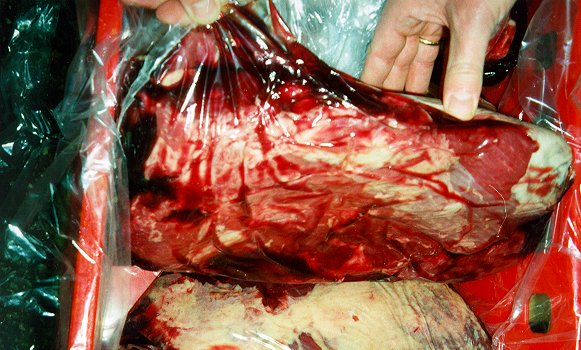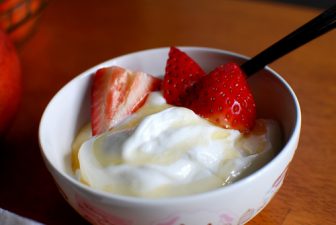Israel’s dubious meat industry gets more sickening: we’ve already covered exposes of poultry fed with feces and pumped with toxic contaminants. Now it’s all about beef and how it’s frozen, treated laundry style and then resold as fresh.
The consumer watchdog TV show, Kolbotek, also exposed extreme cruelty toward cattle and sheep brought for slaughter in one of Israel’s prime slaughterhouses, Adom Adom.
Kolbotek has sent in undercover agents in the meat processing industry. The meat and poultry in fact is “treated” with water and phosphate additives to make it appear to be fresh cut meat, in order to sell it at higher prices.
Israeli Consumer Products Law restricts the amount of water that is added to meat to no more than 5 percnt of the meat’s total weight. The actual amount of water, however is much more; often exceeding 15% or more.
Even if the actual water content is indicated on packages of frozen meat, high water content result in the meat being considered as “fake” or not of a quality suitable to be marketed as fresh meat.
Due to the high prices of beef and other meat sold to Israeli consumers, the average citizen eats less beef and other high priced meat (only 15 kg per person a year) than people living in meat consuming countries like Argentina, Australia, the US and the UK.
Israeli consumers interviewed by Kolbotek said that when it came to eating certain cuts of meat, like entricote steak for example, they know that cuts coming from frozen meat are less attractive and do not taste the same as fresh cuts.
Water being added to both meat and fish products has been an issue that has previously been covered by Kolbotek; as well as by Green Prophet, especially in regards to imported frozen fish products from China that are said to be pumped full of water and chemical additives.
According to Kolbotek’s narrator, Rafi Ginat, it now appears that literally thousands of tons of frozen meat, imported from countries like Argentina, Uruguay and Australia are treated with a solution of water and sodium triposphate, also known by the code name of STPP M212.
Sodium Triphosphate, the same additive used to improve the appearance and taste of frozen fish, is also used in a variety of other products, including tooth paste and cleaning compounds. The meat in question is often sold in local supermarkets as entricot steak and other higher priced “fresh” meat. This also includes higher priced poultry like pullets or “Spring Chicken”.
How the “meat laundering” process works is something that might be compared with washing clothes in a front loading washing machine.
The thawed frozen meat is put into a large revolving drum and treated in a “bath” of water and STPP solution that gives the meat a more desirable color as well as adding weight to it. The treated meat is then packaged and sold as fresh meat at a much higher price than the frozen variety.
Kolbotek sent its investigators to several large Israeli supermarket chain stores, including Shufersol Deal, Rami Levi; and Baladi, a large wholesale meat supply company. Meat samples were tested for concentrations of water and chemical additives like STPP.
Meat samples were tested in local laboratories, as well as being sent for testing in a large European laboratory for comparison with meat sold there, according to European standards.
It was found that many of the Israeli meat samples were considerably lower in quality than those found in most European countries, which have strict laws dealing with meat cuts that are sold as fresh and not frozen.
This was particularly so for meat samples sold in the Rami Levi supermarket chain, which were found to be high in phosphates and other chemical additives.
Kolbotek interiewed Ms. Angie Gaon Eidelberg, a former engineer with the Israeli Health Ministry’s food quality division, who told them that “fresh” meat sold in Rami Levi’s Ashdod branch was “full of water and chemicals; and was not fresh meat at all but “fake” meat being represented as fresh.
The meat also contained high levels of vitamin C additives that make the meat look more attractive. Some meat samples from sources like the Baladi meat company and from the previously mentioned Adom Adom
meat processing company were found to be acceptable but much higher in price than the “fake” samples.
In fact, cuts like entrecote steak from these acceptable sources sell for much higher prices; up to NIS 150 per kg. Rami Levi’s spokesperson told Kolbotek that they sell meat from Baladi that is of high quality; but Kolbotek’s investigation appears to prove otherwise.
The entire “meat laundering” scandal, as exposed by Kolbotek, can be seen here (in Hebrew):
The bottom line of findings by Kolbotek indicates that “there is no fresh quality meat like entrecote steaks that sell for NIS 70 a kilogram.”
Rafi Ginat, Kolbotek’s long time narrator, ended the program by saying that ” we cannot trust even the health ministry to tell us what is fresh and what is not; we can only trust ourselves to find good quality meat.”
The fresh meat test:
He added that one of the most simple tests is to insert your finger into the muscle of a piece of meat being sold as fresh; and if the depression created in the muscle stays there afterward, the meat is thawed out and not fresh.
Read more on issues surrounding Israel’s meat industry:
Israel’s Cruel Meat Industry Exposed by Watchdog TV Show
Israeli Meat Fed With Feces and Pumped With Toxic Contaminants
The Meat You Eat May Not be What You Think





Comments are closed.